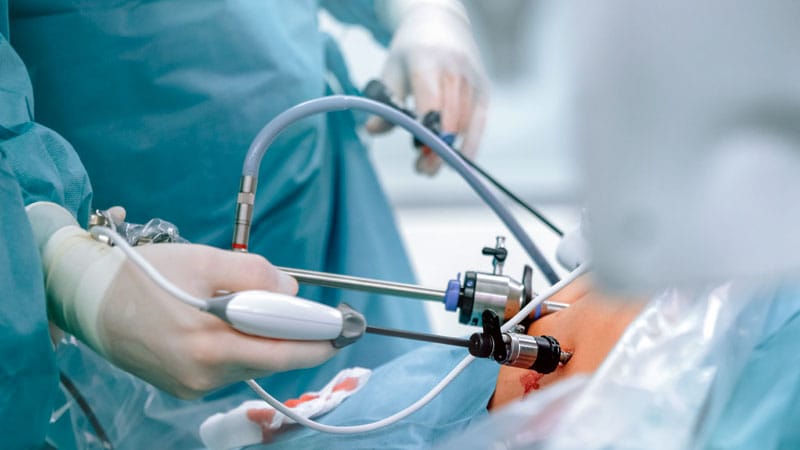Fitness
Bariatric Surgery Lowers CV Risk in People With Sleep Apnea

Weight loss achieved through bariatric surgery lowered the risk of major adverse cardiovascular events (MACE) by 42% and all-cause mortality by 37% in people who were obese and had moderate-to-severe obstructive sleep apnea (OSA) compared with patients who didn’t have the surgery, according to results from the retrospective MOSAIC study.
This study is important “because it targets the main driver” of OSA, which is obesity and fat accumulation, Ali Aminian, MD, of the Cleveland Clinic, told Medscape Medical News. The results were published online June 21 in the Journal of the American College of Cardiology.
Although OSA is a common condition, affecting close to 1 billion people worldwide, it’s also a field where clinicians have lacked robust data to drive treatment decisions, Aminian noted.
Widely used positive airway pressure (PAP) treatments provide symptom relief but have not been shown to provide larger health benefits. For example, PAP treatments have failed in randomized clinical trials to deliver benefits in MACE for patients with OSA, Aminian and coauthors say. In addition, there are currently no approved pharmacologic therapies for OSA, the authors say.
To understand the potential benefit of bariatric surgery for people with sleep apnea, Aminian and colleagues conducted a retrospective cohort study of adult patients with obesity and a moderate-to-severe form of sleep apnea who had been seen within the Cleveland Clinic Health System between 2004 and 2018.
The observational study included 13,657 adults with a body mass index (BMI) of 35-70 kg/m2 and the presence of moderate-to-severe obstructive sleep apnea. Researchers looked at data for 970 patients who underwent bariatric surgery and 12,687 patients who were treated other ways. Follow-up ended in September 2022.
To minimize the effects of confounding factors, researchers used overlap weighting — a propensity-score method that attempts to mimic attributes of randomized clinical trials — and outcome regression to compare outcomes in surgical and nonsurgical groups.
Study investigators found the cumulative incidence of MACE at 10 years was 27% in the bariatric surgery group and 35.6% in the nonsurgical group (adjusted hazard ratio [HR], 0.58; P P = .009).
People with obesity and apnea often need to lose more weight than they likely can manage through lifestyle changes alone, Aminian said.
They should be treated with “effective and durable methods” such as bariatric surgery or new obesity medications that can significantly improve their outcomes, he said.
The current findings could be part of efforts to make these approaches more common and improve insurance coverage for them, he added.
Limitations of the study include its reliance on data from a single source, the Cleveland Clinic Health System. The authors also noted the potential for coding errors for diagnoses and procedures, as has been known to happen with electronic health record data.
“Surprising” Findings
The findings from MOSAIC drew praise from two researchers who were not affiliated with the study. They read the paper at the request of Medscape Medical News.
David Kuhlmann, MD, is medical director of sleep medicine at Missouri’s Bothwell Regional Health Center and a spokesman for the American Academy of Sleep Medicine.
“The most surprising part of the study for me was just how much metabolic surgery appeared to decrease the incidence of heart failure,” Kuhlman said in an email, noting the report of a 70% lower risk for the condition.
Kuhlmann suggested that more research should be done to see if weight loss medications could provide the same benefits as surgery.
“It would give patients another potential non-surgical approach to managing their obstructive sleep apnea,” he wrote.
As reported today by Medscape Medical News, two other studies in patients with OSA and obesity, presented at the American Diabetes Association 84th Scientific Sessions, showed a reduction in sleep apnea with the diabetes and weight loss drug tirzepatide.
Vsevolod Polotsky, MD, PhD, of George Washington University School of Medicine & Health Sciences, who has published many research papers on sleep medicine, praised the approach used by Aminian and colleagues at Cleveland Clinic.
In an interview with Medscape Medical News, Polotsky said it would not be possible to do a randomized controlled trial to see how people with apnea and obesity fared after bariatric surgery, likely for ethical and practical reasons.
No institutional review board would agree to a study of this kind, and even if one did, many of the people most likely to participate would not want to face the chance of being somehow randomized not to have the treatment, he said.
Instead researchers need to create approaches based on the existing pools of data to try to answer important questions about different approaches to apnea treatment, as Aminian and colleagues did with a project based on patient records.
The study used “a sophisticated statistical analysis” to try and account for problems with a retrospective study where you can never really have matched subjects as you would in a randomized clinical trial, Polotsky said.
The research was funded by the Cleveland Clinic Health System. Aminian has reported receiving grants and personal fees from Medtronic, Eli Lilly, and Ethicon. Other authors have disclosed receiving research support, royalties, grants, consulting payments, honorarium and other connections with the American Journal of Respiratory and Critical Care Medicine, AbbVie, Amgen, and Harmony Biosciences, AstraZeneca, Bristol Myers Squibb, Eli Lilly, Esperion Therapeutics Inc, Jazz, Medtronic, MyoKardia, New Amsterdam Pharmaceuticals, Novartis, Oxford, Silence Therapeutics, Suven, Takeda, the American Academy of Sleep Medicine American Board of Internal Medicine, and UpToDate. Polotsky and Kuhlmann have reported no relevant financial relationships.
J Am Coll Cardiol. Published online June 21, 2024. Abstract
Kerry Dooley Young is a freelance journalist based in Washington, DC.










